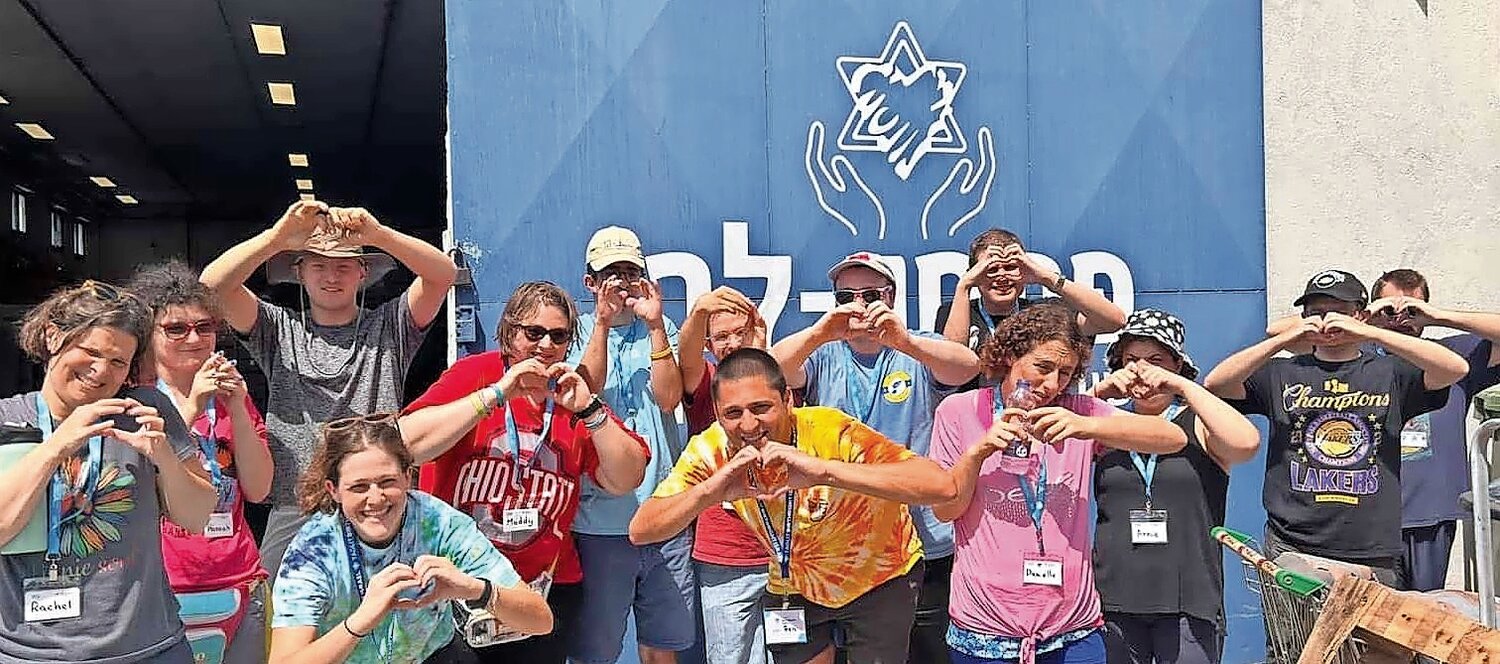Disabled adults volunteer during Birthright trip
Eight days in Israel leading the first-ever Ramah Tikvah Birthright Israel Onward disabilities service trip provided insight into how a group of adults ages 21 to 41 — all with intellectual and developmental disabilities (most on the autism spectrum) — are capable of connecting deeply with the Jewish homeland and its people, and of making important contributions through their volunteer efforts.
The delegation, current participants or alumni of Ramah Tikvah disability inclusion programs, have spent many summers at Ramah camps, where they forged ties with Israelis from their mishlachot (Israeli delegations), learned Israeli songs and dances, and grew to appreciate the importance of the Jewish state in their lives.
After Oct. 7, participants in Ramah Tikvah programs saw community and family members — and friends from their respective camp communities — travel to Israel on service trips. Could they help as well?
Taglit Birthright Israel offers a dozen “classic” trips with necessary supports and accommodations for participants with mobility challenges, as well as an American Sign Language program, a trip for those in 12-step recovery programs and more.
When I pitched the idea of a volunteer trip for people with disabilities, Onward Israel CEO Ilan Wagner immediately gave the green light. This group would need accommodations not usually provided to typical Birthright Israel Onward participants.
Last month, even as the war in the Gaza Strip and the hostage situation continued and with an escalation looming with Hezbollah in the north, 12 participants and four staff members arrived at a hotel in Tel Aviv, ate dinner, got some rest and hit the ground running the next day.
• • •
We began with morning services at the Nahum Gutman Mosaic Fountain in Tel Aviv, reciting the Shehecheyanu prayer. Then we headed out — Bingo cards in hand — in search of various famous Tel Aviv landmarks on the Independence Trail.
Our guide, Caroline, who was born paralyzed, is the No. 6 wheelchair table-tennis player in the world and shared what sports means to her. We watched Israel’s national wheelchair basketball team engage in a tough practice, and after speaking with team members, got to try out their specially designed chairs.
Then it was off to a small Chabad shul in Tel Aviv to do our part for the Tzitzit for Tzahal project, an initiative to prepare 200,000 pairs of ritual army-green fringes for soldiers.
The next day saw us at Pitchon Lev: Breaking the Cycle of Poverty in Rishon Letzion, where we assembled 180 large boxes and filled each with diapers and packs of wipes, later setting off for a special tour of the ANU Museum of the Jewish People on the campus of Tel Aviv University.
On Friday, we travelled to Jerusalem, shopping on Ben-Yehuda Street, riding EZRaider electric motorized vehicles, and visiting the Old City and the Kotel before heading back to Tel Aviv in time for prayers, Shabbat dinner and an Oneg Shabbat.
Saturday began with morning prayers at the beach, followed by swimming in the Mediterranean, a walk, lunch and visits by Israeli friends and family members. We ended with a beautiful Havdalah service that reminded participants of the many similar ones at their respective camps.
On Sunday, we set off for the first of two days of olive picking at Harvest Helpers Leket Israel in Rishon Letzion. We learned that our olives would be made into olive oil for Israelis in need. Our participants once again felt a connection between their volunteer work and people receiving direct benefits.
Our afternoon visit to Hostage Square in Tel Aviv was quite emotional. We walked through a makeshift tunnel, looked at the empty Shabbat table and chairs (now under a sukkah) in tribute to the hostages, viewed art installations and purchased “Bring Them Home Now” shirts, dog tags and ribbons.
During breakfast on Monday, the staff learned that beause the situation in the north was heating up, we were being instructed to leave the hotel in under an hour and relocate to Jerusalem after our morning of olive-picking. Participants remained calm, adjusting to an abrupt change of plans (not usually easy for people with autism) and quickly packing up.
Our scheduled culinary tour in Tel Aviv turned into a similar tour in Jerusalem’s Machane Yehuda open-air market, a walk through the adjoining Nachlaot neighborhood and a stop for some ice-cream.
Our last full day in Israel began at Pantry Packers, where we worked in four-person teams to pack peas and other dried goods for Israel’s needy. After putting on aprons and hairnets, two team members placed separate labels on bags, one operated the machine that dispensed the grains into bags, and one used the sealing machine.
Our tour guide, Rotem, encouraged the group to go home and serve as ambassadors, sharing their experiences. The participants were unified in asking one question: “When can we come back and do this again?”
My hope is that the Jewish community will continue to create meaningful opportunities for adults who have both disabilities and amazing strengths, so as to be fully included and feel a sense of belonging.
Howard Blas is director of the National Ramah Tikvah Network. To reach him, write: Columnist@TheJewishStar.com






